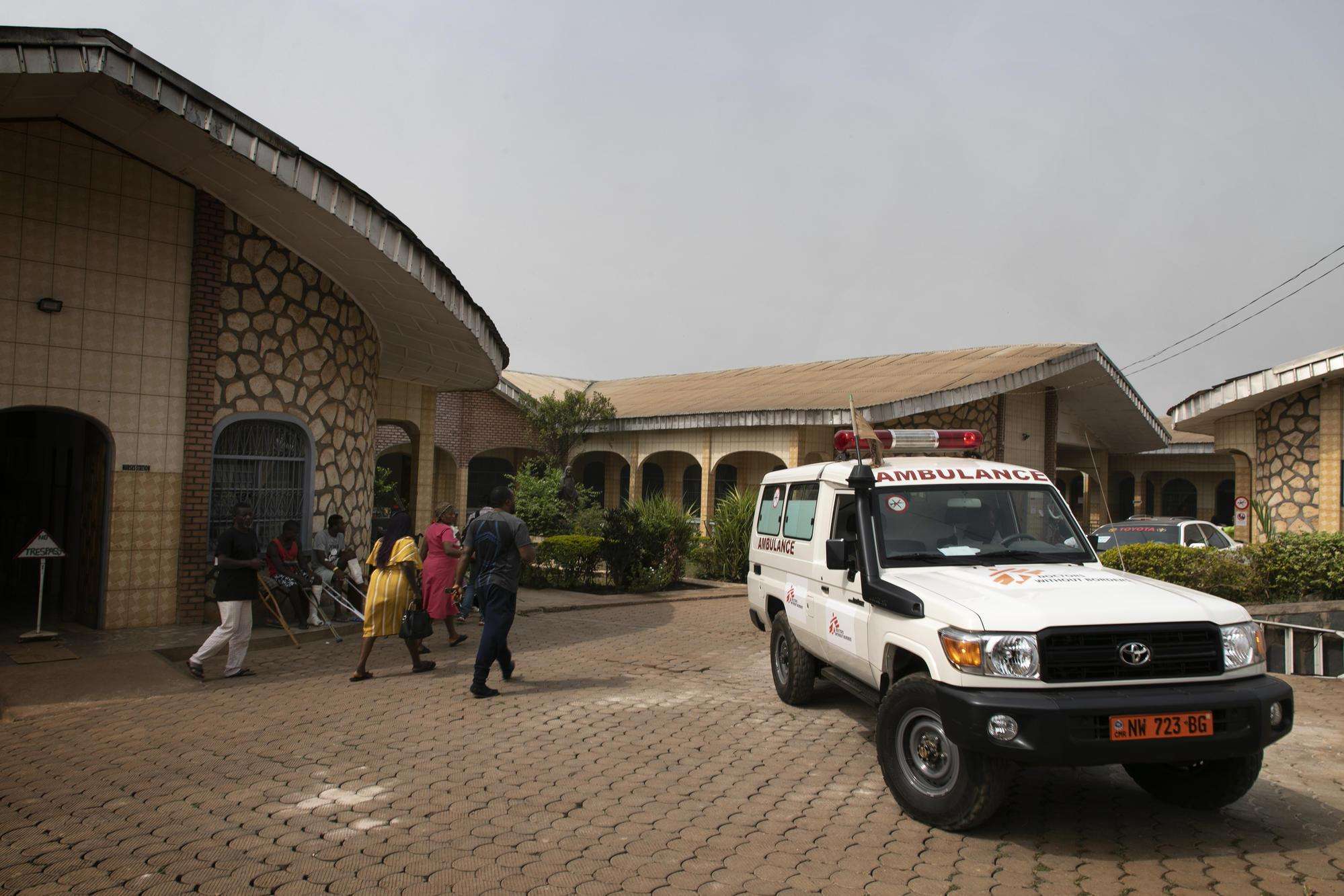YAOUNDÉ/NEW YORK, JUNE 22, 2021—The international medical humanitarian organization Doctors Without Borders/Médecins Sans Frontières (MSF) continues to be denied authorization to resume health care services in the North-West region of Cameroon six months after authorities forcibly suspended its activities. MSF calls on the government of Cameroon to immediately lift the suspension and prioritize the medical needs of the tens of thousands of people in the region who are struggling to access vital health care.
On December 8, 2020, MSF was suspended from working in the North-West region by Cameroonian authorities accusing the independent nongovernmental organization (NGO) of supporting non-state armed groups in the area. Despite months of discussions rejecting such allegations, MSF has still not been granted authorization to resume operations, leaving tens of thousands of people without access to free lifesaving health care. MSF is an independent medical humanitarian organization that does not take sides in any conflict and provides care to people based on needs alone.
“Vital medical services have been denied for six months now, and this is taking an unacceptable toll on Cameroonian citizens, many of whom have fled to the bush, unable to bear the sights, sounds, and threats of violence any longer,” said Emmanuel Lampaert, operations coordinator for MSF in central Africa. “This decision represents a substantial blow to medical and humanitarian access. As we speak, our community health workers see people die and suffer because of the lack of treatment available in villages and displaced communities, and our ambulance call center continues to receive emergency requests, which they are forced to decline. What rationale can justify these unnecessary deaths?”
For more than four years, extreme violence in Cameroon’s North-West and South-West anglophone regions has led to a catastrophic situation. Raids on villages, kidnappings, torture, destruction of property, and extrajudicial killings commonplace in what is often referred to as the “anglophone crisis”.
In 2018, in agreement with Cameroon’s Ministry of Health, MSF launched an emergency response to the critical health situation by supporting health facilities, setting up the only free 24/7 ambulance services in the regions, and supporting community health volunteers in order to reach people living in remote areas and those struggling to access health care facilities.
A massive health care crisis
According to the United Nations (UN), the escalation of violence has pushed more than 700,000 people to flee their homes, while over 60,000 have fled to neighboring Nigeria. Today, people’s living conditions are massively affected by the crisis and over 1.4 million people are considered to be in need of humanitarian support. While armed violence and violations of human rights have made headlines in recent years, the impact of the crisis on people’s basic medical needs is often overlooked by international media.
“Because of insecurity, lockdowns, curfews, and the targeting of health facilities, access to health care is extremely limited, with at least one in five facilities not functioning,” said Lampaert. “Displaced [people] barely dare to [go] to health facilities, and the economic downturn has made it still harder to travel to hospital, or even to afford treatment. Unsurprisingly, mortality among vulnerable groups, such as women and children, has increased, and the suspension of our medical support made the situation even worse.”
While MSF teams have treated patients for rape, torture, burns, and gunshots, the majority of patients were those in need of medical assistance for childbirth, malaria, or diarrhea, especially among displaced communities. Last year, MSF-supported community health workers conducted over to 150,000 consultations for communities in both regions.
Restricting humanitarian space
The support provided by MSF and other humanitarian organizations have proved to be vital as insecurity and attacks on staff have reduced the number of organizations present in the region providing lifesaving services.
“We are one of the few medical organizations present in those two regions,” said Lampaert. “Since we started our interventions, our medical staff, volunteers, and patients have regularly faced threats and violence from both state and non-state armed groups, with very little respect shown for our humanitarian principles of impartiality and neutrality. Our ambulances have been [shot at] and stolen, community health workers have faced sexual assault and murder, armed men have opened fire inside medical facilities, and our colleagues have faced death threats. Despite these extremely difficult situations, our staff kept on providing care to people in need, day after day.
“We call once again on the government of Cameroon to put the needs of the [people] first, and to immediately reinstate MSF’s essential medical services in the North-West. Our operations cannot remain on hold indefinitely.”
MSF has worked in Cameroon since 1984. Today we run medical humanitarian projects in the far north and the South-West regions. MSF first worked in the North-West region in 2018. Before operations in the North-West region were suspended in December, in 2020, MSF teams treated 180 survivors of sexual violence, provided 1,725 mental health consultations, performed 3,272 surgeries, and referred 4,407 patients by ambulance (of which more than 1,000 were women in labor). MSF-supported community health volunteers also provided 42,578 consultations, mostly for malaria, diarrhea, and respiratory tract infections.
MSF works in many countries where government forces and non-state armed groups clash. Regardless of where we are, MSF is committed to providing health care to everyone who needs regardless of political or religious affiliations, race, or gender.




